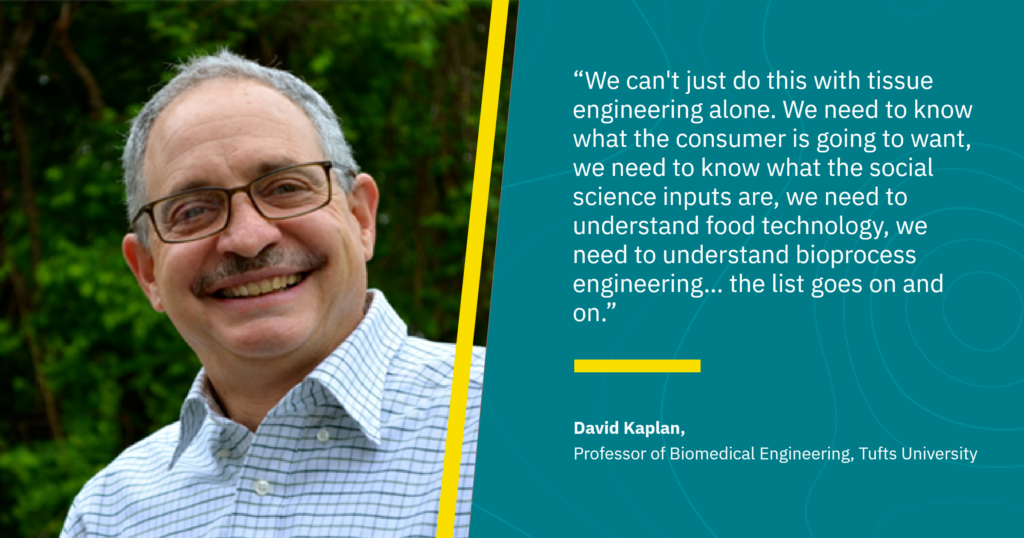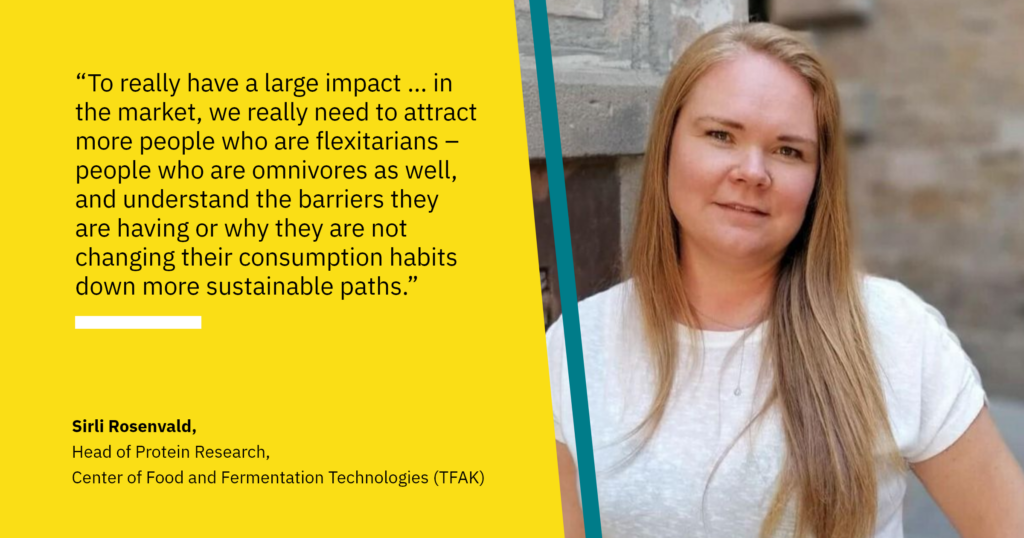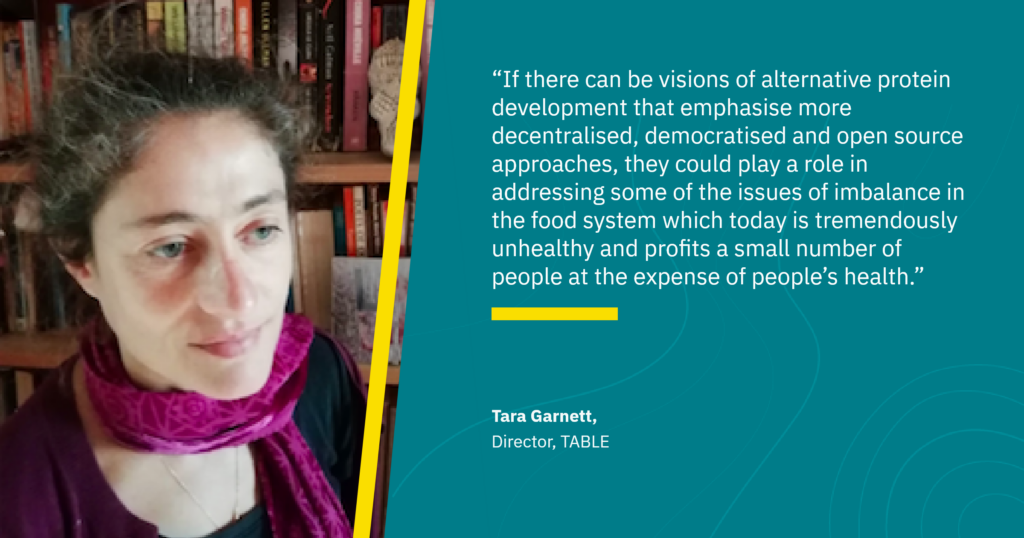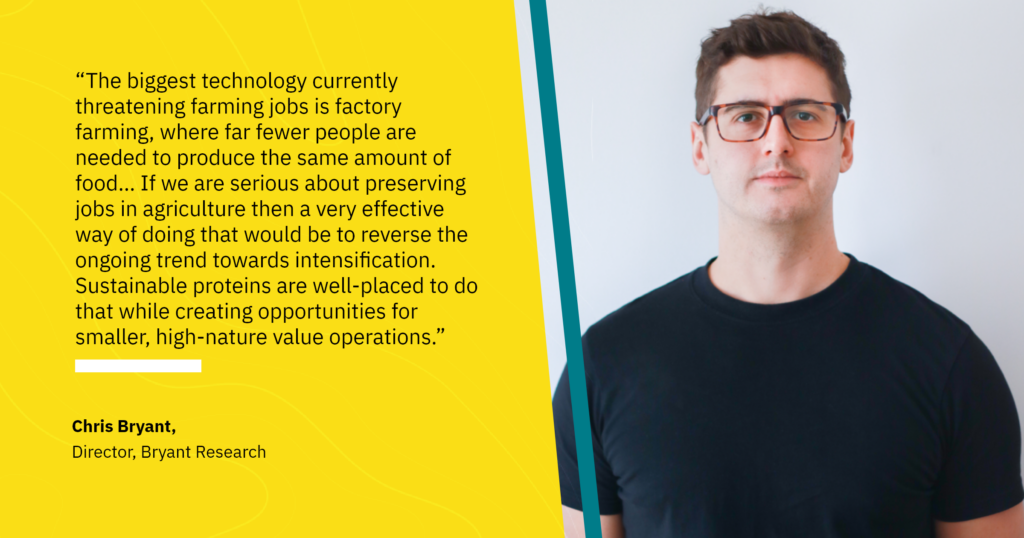6 key priorities to accelerate sustainable protein science
“The most holistic, multi-disciplinary approach… to solving a global challenge I’ve come across in my career”

Recent scientific developments in plant-based foods, cultivated meat and fermentation have been incredible, but there is still a huge amount of work to do for sustainable proteins to transform the future of food. A holistic and interdisciplinary approach centred around collaboration is essential to further accelerate this progress and translate it into a more sustainable, secure and just food system.
This insight was the foundational idea behind the recent webinar co-hosted by CellPress and GFI Europe to explore and understand the interaction between science and society, and how this can be used to accelerate sustainable protein research. The six expert speakers present at the meeting each delivered a novel perspective on how their field of research could help accelerate scientific innovation in this dynamic field.
The story so far
Ten years ago the first cultivated meat burger, made by Mosa Meat founder Mark Post and his team, took three months and €250,000 to make. Today, the fastest processes take as little as eight days, and consumers in Singapore can buy a cultivated chicken kebab for just $18.50 SGD (approximately €13) from Huber’s Butchery. However, further advances must be made before cultivated meat can reach the mass market.
For plant-based and fermentation-made proteins too, innovators have made enormous leaps forward, with tastier, cheaper, more nutritious next-generation products just beginning to hit the shelves. And startups across Europe are using precision fermentation, a well-established technology used to make rennet for conventional cheese and ingredients like citric acid, to produce animal fats and proteins with a fraction of the environmental impact.
The 6 key priorities to accelerate sustainable protein science through collaboration
1. A rising tide lifts all boats: collaboration to boost scalability

Professor David Kaplan leads an 18-strong research team at Tufts University, working to explore and understand the science of cultivated meat. His group also delivers one of the world’s first undergraduate modules on cultivated meat, helping to bring interested students into the field.
To scale up production, David highlighted that an interdisciplinary approach is essential. The skillset and knowledge needed to cultivate meat is very different from that needed to design a cost-efficient fermentor for it to grow in, which is different again from that needed to build and plumb it in.
With this approach, David’s team has been able to reduce media costs by 90% in three years, while eliminating animal serum from their growth medium.
An interdisciplinary approach can not only overcome barriers but also add new value and benefits. One exciting example of this is nutrition – with cultivated meat being developed to have reduced saturated fat and increased omega-3 fatty acids. David also sees huge potential in hybrid products as a key part of scaling, working in partnership with plant-based and fermentation specialists.
Take home: Everyone, and students in particular, should get involved to help bring innovative new approaches to the table.
Key resources:
- About cultivated meat.
- Cultivated meat research priorities.
- GFI’s sustainable protein career portal.
- GFI’s alternative proteins researcher directory.
- GFIdeas community.
2. It’s got to taste good: understanding and overcoming the barriers to mainstream adoption, and tailoring solutions

Sirli Rosenvald’s work in fermentation and pioneering plant-based products has enabled her team’s progress to the finals of the Xprize ‘feed the next billion’ competition, a prestigious international award designed to find and fund some of the most promising solutions to global challenges. She emphasised the importance of creating products that were not only sustainable, but also delicious and accessible.
Taste is an area that is particularly important to open up the appeal of sustainable protein products. Sirli believes her area of expertise, fermentation, has significant potential in this area. Fermentation can significantly enhance the flavour of foods, bringing out rich umami flavours often also associated with conventional meat.
Able to utilise waste streams from food and even forestry sectors, fermentation is also incredibly efficient and can be used to produce high-quality food even in regions experiencing harsh weather or with little arable land. This aspect is particularly crucial considering the increasing importance of food security worldwide, and is key to ensuring sustainable proteins are both tasty and accessible.
Take home: Unless they are accessible and meet expectations on taste and price, sustainable proteins will struggle to achieve broad adoption.
Key resources:
- Our meet the researcher piece exploring Sirli’s work.
- About fermentation.
- Fermentation research priorities.
- About behavioural considerations in food choices.
3. In such an interconnected field, open science is essential

Sisse Marquina-Jongberg’s work has been instrumental within the Novo Nordisk Foundation Plant2Food Platform, which seeks to identify and fund key research at the intersection of plant and food science. An open science approach lies at the heart of the project, which requires all outputs from both academic and industrial partners to be shared openly so that others can learn from and build upon the findings. The project stemmed from the fact that plant science – having traditionally focussed on optimising crops for animal feed – and food science often stand at odds in terms of the utilisation of crops for human consumption.
Open science enables all parties to maximise the impact of finite research funding, helping the whole community to learn from and build upon the advances of their peers. Without this transparency, the rate of innovation can be significantly slowed by multiple teams having to conduct the same underlying research, or pursuing dead-ends that others have already explored and abandoned.
In a landscape where research and development is proliferating in both academic and commercial organisations, and whose outputs could help meet urgent global challenges, reducing duplication of effort and maximising efficiency is crucial.
Take home: To deliver these time-critical innovations, collaboration and open science approaches are a must.
Key resources:
4. Focusing on efficiency: evidencing the need for sustainable proteins, and tapping into promising resources

Volker Heinz heads up the German Institute of Food Technologies, where he works to evidence the ‘why’ of sustainable proteins, and how to maximise food system efficiency. From an environmental perspective, he explained that ‘talking about protein means talking about nitrogen’. He pointed out that, of the 6kg of nitrogen consumed each year by the average European, 4kg is derived from animal proteins.
Nitrogen is an essential building block of the food system and the natural nitrogen cycle is delicately balanced and complex. However, it is increasingly being thrown off-kilter by nitrogen pollution in agriculture, which is hugely exacerbated by intensive animal agriculture (and producing its inputs).
Historically, food systems have neglected grasslands and non-arable land as a direct source of human nutrition, instead relying on grazing animals as a hugely inefficient middle-man. Indeed, Volker noted, if we can fully utilise proteins from sources such as grasslands, then up to 80% of Europe’s agricultural area could be freed up for nature restoration, reforestation, and sustainable farming.
This idea is not new, and in fact researchers as far back as the 1960s began exploring the potential of grassland to provide humans with food directly. The approach had the potential to combat famine and improve food security, but limited means and funding meant that their research never led to mainstream adoption. However, growing pressure on food systems from climate change has led to renewed interest in the field, and new technologies could enable the extraction and utilisation of this abundant protein source.
Take home: We must think outside the box about the solutions available to us to find the most efficient and sustainable solutions.
Key resources:
- More on the German Institute of Food Technologies.
- More on research into rubisco as a food source.
- Plant-based meat science.
- Plant-based meat crop development.
- Plant-based research priorities.
5. Fixing a broken food system: beyond environmental sustainability, sustainable proteins must also help democratise and decentralise how we produce and consume food.

Tara Garnett is the Director of TABLE, a global platform for academics to share knowledge, reflect and engage in dialogue about the future of food. She called for urgent measures to fix a broken food system dominated by corporate interests, which delivers cheap, convenient, unhealthy food that takes away people’s agency and compromises their health.
As an alternative to this system, she outlined two complementary visions:
- The major scale-back of industrial animal agriculture, with a shift towards high nature value approaches with significantly fewer farmed animals.
- Using whole plant foods to replace the current high-protein focus, slashing consumption of low-quality and unhealthy foods.
While ultimately advocating for a primary focus on vegetables, legumes and whole grains, she believes alternative proteins could have a role in helping to reduce current animal suffering and the food system’s environmental impacts. Whole foods like lentils have long been cheap and available to consumers, and yet demand for meat continues to grow and diets have become increasingly unhealthy. Plant-based foods, cultivated meat and fermentation could help satisfy current demand for meat, freeing up land for the first vision, while paving the way for the second vision by acting as a bridge towards plant-forward ways of eating. This won’t happen without policy interventions that take a much more systemic, interconnected approach to addressing the social, ethical and environmentals harms caused by the food system.
Take home: Our food system is broken and harming people’s health. Alternative proteins are not a silver bullet, but they could offer a stepping stone towards a more equitable system, if achieved through a democratised and decentralised approach to food production. This should be combined with a policy focus on shifting food systems and cultures towards those that emphasise diets rich in unprocessed fruits, vegetables, legumes and wholegrains.
Key resources:
- More on TABLE.
- Join the TABLE community discussion platform.
- TABLE’s discussion paper exploring debates on the role of farmed animals and alternatives in diets and farming.
6. Ensuring a just transition: building towards a future where nobody is left behind

Chris Bryant is the Director of Bryant Research, an organisation specialising in social sciences. Political and economic expertise is becoming increasingly relevant to the sustainable protein sector, particularly as it begins to see opposition in the form of labelling restrictions and even a proposed ban on cultivated meat. This fledgling sector is fundamentally dependent on public and private investment in research and commercialisation, so progress could be jeopardised without the input of this expertise.
Chris has used his research background to explore some of the political barriers to the expansion of plant-based foods, such as perceived threats to farming communities. Mounting pressure from climate change, inflation and geopolitical instability have accelerated the intensification of European farming, with small-holding farmers being the main victims. Articulating and communicating the solutions offered by sustainable proteins to complement nature-forward techniques and grow and diversify European farming, rather than undermining it, is therefore hugely important.
Likewise, Chris highlighted the emerging heuristic, promoted by the meat industry, that natural equals healthy, and processed equals unhealthy. This idea is widely known but poorly understood by consumers: a recent survey found consumers were more likely to think plant-based meat was ultra-processed than conventional processed meat like ham, chicken nuggets and sausages. In reality, processed conventional meat has featured heavily in studies of ultra-processed foods (unlike plant-based meat) and has been significantly associated with health risks.
This has been an area of particular concern for Chris as many reasons typically given for ultra-processed foods being unhealthy (eg high-calorie, low-fibre, hyper-palatable, and not filling) don’t necessarily apply to plant-based meats – making the label inaccurate for the category as a whole. In fact, while more research is needed, studies exploring the health impacts of swapping conventional meat for plant-based versions have generally been positive. Social scientists can bring crucial insights to help the sector communicate these benefits to policymakers and the public.
Take home: The social sciences have an essential role to play in fostering a supportive political climate that fosters sustainable protein innovation.
Key resources:
- Bryant research findings on the healthiness of plant-based foods.
- Report modelling opportunities for small and medium-scale farmers through a reduction in intensive animal agriculture and dependence on imported animal feed.
- Study on consumer perceptions of precision fermentation-made dairy.
- Research on European attitudes to meat consumption and sustainable proteins.
The imperative of achieving a sustainable food transition
The science of sustainable protein is a thrilling and fast-evolving field, and has the potential to fundamentally change our food systems for the better. To ensure continued growth and maximise its impact, interconnectedness and interdisciplinary collaboration are essential. Ingenuity, openness, social justice and efficiency are all essential pieces of the puzzle, and will together form the foundations of a food system that is better for people, the planet and animals.
Learn more about these approaches by watching the full webinar here, and explore our resources to help students and researchers interested in this space:
- Check out our website containing:
- Our research funding database and grants tracker.
- Our course database and free online course on sustainable protein science.
- Our Advancing Solutions initiative, and summary of open access resources which highlights the main sustainable protein knowledge gaps.
- The Alternative Protein Researcher Directory.
- Our GFIdeas community, which runs monthly webinars on key topics in the space.
- Information on our Alternative Protein Project university chapters.
- Our monthly ‘meet the researcher’ blogs.
- See GFI Europe’s Senior Science and Technology Manager Seren Kell’s paper in Nature Biotechnology on how to get involved.

